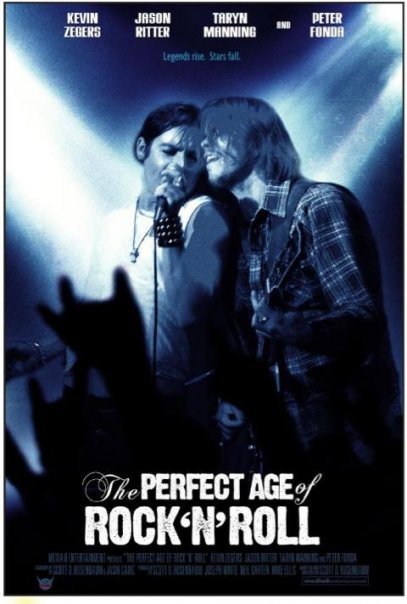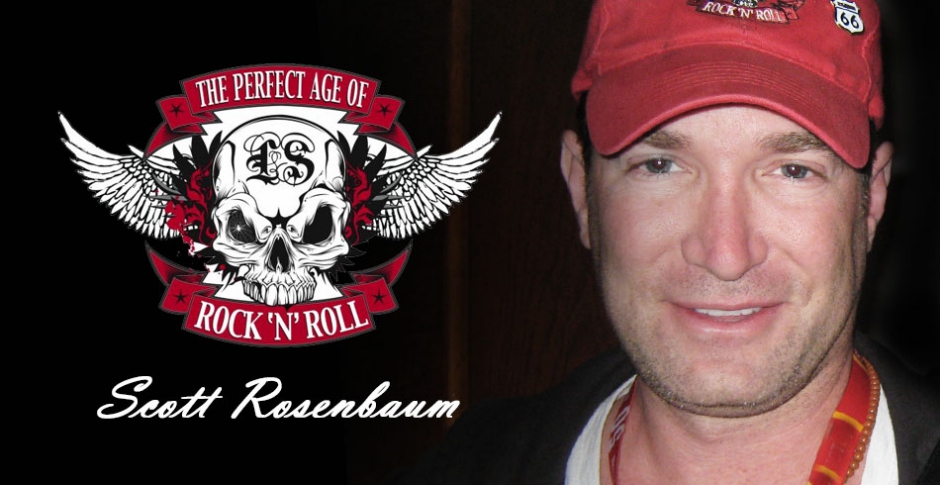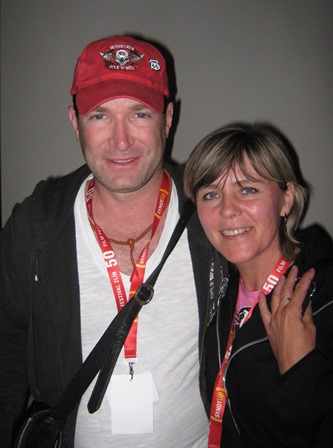Scott Rosenbaum: Story is the key factor
Written by Eva Csölleová, Vítek FormánekYoung American director Scott Rosenbaum belongs to those artists who try to go their own way in quest to make a movie without being dependant on big studio. He wants to be independent and have everything under control. He hails from Long Island, attended Georgie Washington university, gained degree in journalism. After graduation he devoted his time to various projects, wrote screenplays, he learnt to direct, worked in financial sphere and helped improve centers for sick children. Famous director Gene Frankel took him under his wings and after his death he continued to work with Lenor de Koven. In 2002 he started to write script for film he showed also in Zlín Festival called „The Perfect age of rock´n´ roll“. He also colaborated with Oscar director Spike Lee.
 Is there any diference when director wants to make commercial movies or indipendant movies? I mean if the beginning is equal and only working process leads filmmaker either direction.
Is there any diference when director wants to make commercial movies or indipendant movies? I mean if the beginning is equal and only working process leads filmmaker either direction.
I think every director sets out to make the best movie possible independent or a big studio film. Though I’ve not made a studio film yet, I think it’s reasonable to say that the creative freedoms enjoyed as a small budget indie director will be somewhat curtailed as the budgets go up and a studio is involved.
Is it a matter of „feel“, matter of personal statesman or matter of right chance at right time?
If I understand you correctly here, I think your question asks which type of film would a director prefer. If that’s what you’re asking, I can only speak for myself and that is to say that, depending on the subject matter, some stories require the backing of a studio, unless you’re a name director like Oliver Stone and can make a $150 million indie film (Alexander). I have several scripts I’m working on and each would require a different kind of production.
What would you suggest people who would like to make a movie, have only limited experience and little money and equipment?
The technology now available has given anybody the ability to make a film. Not just a film, but a great looking film. The DSLR revolution and the ability to edit an entire film right on a laptop has democratized the filmmaking proces like no other time in history. The one component that has not changed and never will change is story. If you don‘t have a great story to tell, you can have a truckload of equipment at your disposal and it won’t make a difference.
What is essentials ingredience for beginner-film maker? Knowledge of the trade, knowledge of the technique and equipment. Good story, guts or good friends, knowing ropes and enough money?
Simply put, all of the above. An aspiring filmmaker should do whatever is necessary to learn every aspect of the proces. I had read an article years ago by Robert Rodriguez and he spoke of the importance of knowing all sides of the craft. In addition to gaining the understanding of the various disciplines, it also protects you from being taken advantage of when you do get to make a film with a large crew. Unfortunately this does happen on film sets and the best way to protect yourself is to know what you’re talking about.
In 50´s there was French new wave, in Czecho it came in 60´s. Do you think current hi-tech can become new wave of 21.century since it will break stubborn and established rules and principles?
Relative to my answer in question number 2, I think it’s clear that the tools for making a film are readily available and are now right in nearly everyone‘s pocket. If you have a story to tell and the will to do it you could shoot a film with a cell phone, puti t up on line and make it available to the world. That sort of freedom and access wasn’t even contempalted in the 50’s and 60’s. So, as has always

Independent movies or filmmakers don´t have rosey journey. Is it because people are reluctant to see different things or Big Money business try to make it as hard as possible not to loose dominant position?
It’s hard to be „successful“ in any business. The choice of becoming an artist has never been an easy one and the road an artist walks has always been a challenging one. I think the barriers to entry and the barometer of greatness is equal for anyone whether you’re a new filmmaker or and established one. At the end of the day you make your film / tell your story and put it out there for people to view and judge the work. If you’ve had success in the past and you make a bad film, and bad is a relative term. But clearly, box office success will allow a filmmaker to make another film. I can only speak for myself, but I think at the end of the day a filmmaker wants to continue to be able to make films.
Sundance festival is one of the most known independent festivals in the World, but I have read that even there is corruption and films are predetermined upon connections among producers. Do you think that even such independent festival can mellow a bit and slowly becomes mainstream thing loosing it´s edge?
I can’t speak specifically to Sundance, but the challenges of a festival or a filmmakaer dealing with success are largely the same. With success comes opportunities and it’s up to the individual or the organization to determine how they want to deal with them. There’s always a balance that needs to be struck and that balance will vary with each situation. I think the notariaty that Sundance has achieved has helped many unknown independent filmmkers over their history. As I’ve alluded to in some of the previous answers, the proof is in the product. The films have to sink or swim on their own merit regardless of what forum they are given.
Let´s say you are independent director and make two good movies but without big commercial success. Then one producer comes and offers you good money to make a movie? Can you still stand independent or you have to mellow a bit to make it commercial success cos then you could become known, have more doors open and finally either gain success or independance?
As mentioned in the first question, every filmmkaer has choices to make. Everyone has to eat to be sure so money is not necessarily a bad thing. And, if you can get paid to do something that you’re passionate about, all the better. As far as artistic freedom, success and what sacrifice one will make over a given project will vary greatly. Have artists taken work just for the paycheck? Of course. This has happened in every medium from the beginning of time and will always happen. Ultimately one’s career is a culmination of the choices made. Should a filmmkaer pass on a paycheck and project if the rent is due? That will be up to each individual if and when that circumstance presents itself.
Is there any border link between independant and mainstream? Any set rule? If you organize independent festival, you still need money, so if they are from fans they are independant and if they are from corporate companies and they wanna logo and ads, is it already commercial?
For better or worse, sponsorship of some kind is innevitable and required. It’s a catch 22 in that if you want to provide a platform for films to be seen, that platform is going to require money for the countless components that are required to put on a festival. At the end of the day I think that all festivals, like all filmmakers are trying to be the best that they can and present the best work possible. It’s up to the filmmakers, festival directors, programmers, and ultimately the audiences to determine what they deem to be a great film.
In your new project called The Lunatics you did everything yourself, filmed it, edited it, directed it, the lot. Was it because you wanted to learn everything by yourself so no one could make fool of you or you try to be as independent as possible and it´s also the way how to save money?
I would say BOTH. As screenplay writer, and amateur photographer I always wanted to master all aspects of film making, including things I wouldn´t be normally responsible for, as e.g.editing. And of course I had no money when I started this project, so it forced me to do it this way. In the end only one who could fool me was only myself (laugh).



